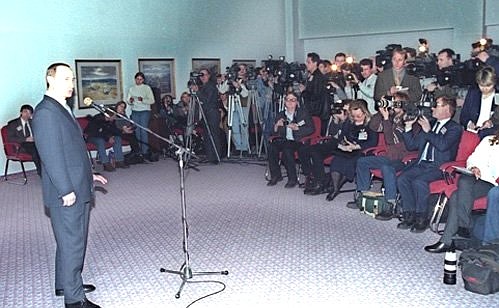
Mr Putin expressed particular concern over Latvia stepping up reprisals against anti-Nazi fighters, especially about the guilty verdict passed on a 76-year-old World War II veteran, Vasily Kononov. The acting head of state said that he had written a letter that morning to President Vaira Vike-Freiberga of Latvia, asking her to intervene in deciding the veteran’s fate. His message said that Russia was ready to receive Vasily Kononov and grant him citizenship.
The Acting President stressed that Russia’s relations with Latvia would develop on the basis of the entire range of the existing issues. Mr Putin recalled the tragic instance of a veteran committing suicide when the police had come to arrest him, and said he was emphatically against any attempts to persecute people who had fought against Nazism.
In a media interview the acting head of state supported the Union of Right Forces’ (SPS) initiative to hold a referendum on private property, parliamentary immunity, professional armed forces, and the President’s right to dissolve the Government. The implementation of these decisions would, in Mr Putin’s opinion, only add to the efficiency of the state.
Mr Putin called attention to the fact that the Central Election Commission rejected the referendum initiative on legal grounds. He said that he had discussed the existing situation with the CEC chairman in a morning telephone conversation, who informed him that the SPS initiative failed to gain approval only due to certain violations in the process of signature collection.
Focusing on the issues raised by the SPS, Mr Putin said he was, for example, in favour of guarantees on property and owners’ rights. They should apply not only to big corporations and companies, he said, but also to citizens’ rights to own flats, houses and plots of land. It is necessary to do away with situations when the state once guarantees the rights of ownership and then steps forward to review them, the acting president said.
Speaking about the need to downscale the immunity of parliament deputies, Mr Putin expressed the view that Federal Assembly members should not be granted absolute immunity, but must be protected by the law when discharging their professional duties.
The acting head of state said that he fully shared the Union of Right Forces’ view on the need to reform the armed forces and go over to a contract service, especially in units deployed in the zones of armed conflicts. The prime minister recalled that the government was already making certain steps in that direction. At the moment the proportion of contract servicemen in the Russian armed forces stationed in the North Caucasus is about 30%.
Commenting on the expediency of limiting the President’s right to dissolve the Government, Mr Putin noted that the question was of little relevance for him, because he was only an acting president.
One of the prime objectives of the state, Mr Putin said in reply to a question about the Government’s priorities, is to crack down on corruption. In the acting president’s opinion, no economic or political progress can be made until this problem is solved. There is only one remedy to fight corruption – a steady, principled, tough and persistent drive for the observance of laws.
In reply to a question about ways of solving environmental problems in Siberia, the acting president said that a board meeting of the Siberian Agreement inter-regional association decided to set up an organisation to draft a project for improving the environmental situation around Lake Baikal.